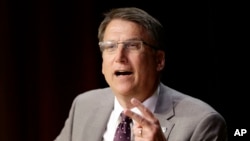North Carolina Gov. Pat McCrory says business lobbyists helped shape a state law limiting protections for LGBT people but that also included employer-friendly provisions banning local minimum wage increases and making it harder for workers to sue for workplace discrimination.
McCrory's assertion contradicts statements by the head of the state's Chamber of Commerce and his aides, who have denied a role in shaping the legislation called House Bill 2.
North Carolina Chamber CEO Lew Ebert said in an email Thursday the organization “had no part in suggesting, drafting or reviewing House Bill 2 and anyone who suggests otherwise is misrepresenting the facts."
Aides for McCrory and GOP legislative leaders did not respond when asked to clarify the conflicting accounts about the business lobby's involvement.
The governor said Wednesday many business leaders who have been critical of the legislation — more than 100 corporations have expressed their opposition and some have reversed plans to expand in North Carolina — do not understand the law's contents and should read it for themselves.
“It's only a five-page bill. There are four parts of it, two parts that the Chamber of Commerce helped write, in North Carolina,'' McCrory said during an interview Wednesday with a news website focused on startup companies. The video was posted on the website of McCrory's re-election campaign organization.
In the interview, McCrory then lists three provisions of the bill beyond the bathroom restrictions on transgender people that have attracted nationwide attention and lawsuits by the Obama administration. Those lesser-known provisions block municipalities from forcing employers to raise the minimum wage they pay locally; prohibit cities and counties from requiring contractors to apply anti-discrimination protections for LGBT people beyond state law; and close state courts to workplace discrimination lawsuits.
McCrory requested and legislators this summer agreed to restore workers' right to sue in state courts, where lawsuits are considered less complex and costly than in federal courts.
At least one business leader said he suspected the chamber agreed to stay quiet about HB2's LGBT provisions because pro-business legislation was attached to it.
“Why would a living wage and a can't-sue-the-company-for-discrimination end up in this bill? It's because they got the sign-off from the state Chamber," Capitol Broadcasting Co. CEO Jim Goodmon said after the law was passed. “That's the only explanation I can come up with."
About six weeks later, Ebert ended his silence. In an interview with Time-Warner Cable, he denied the business lobby sought the minimum wage freeze and said the chamber played no role in writing HB2.
On Wednesday, McCrory — seeking re-election in November against Democratic challenger and Attorney General Roy Cooper — released a new TV ad in which he seemed to express disbelief at the dispute over gender and bathroom use.
“You know, when we were raising the average teacher pay, creating new jobs and cutting taxes, other folks were actually pushing to make our schools allow boys to use the girl's locker rooms and showers," McCrory said in his ad. “Are we really talking about this?"




